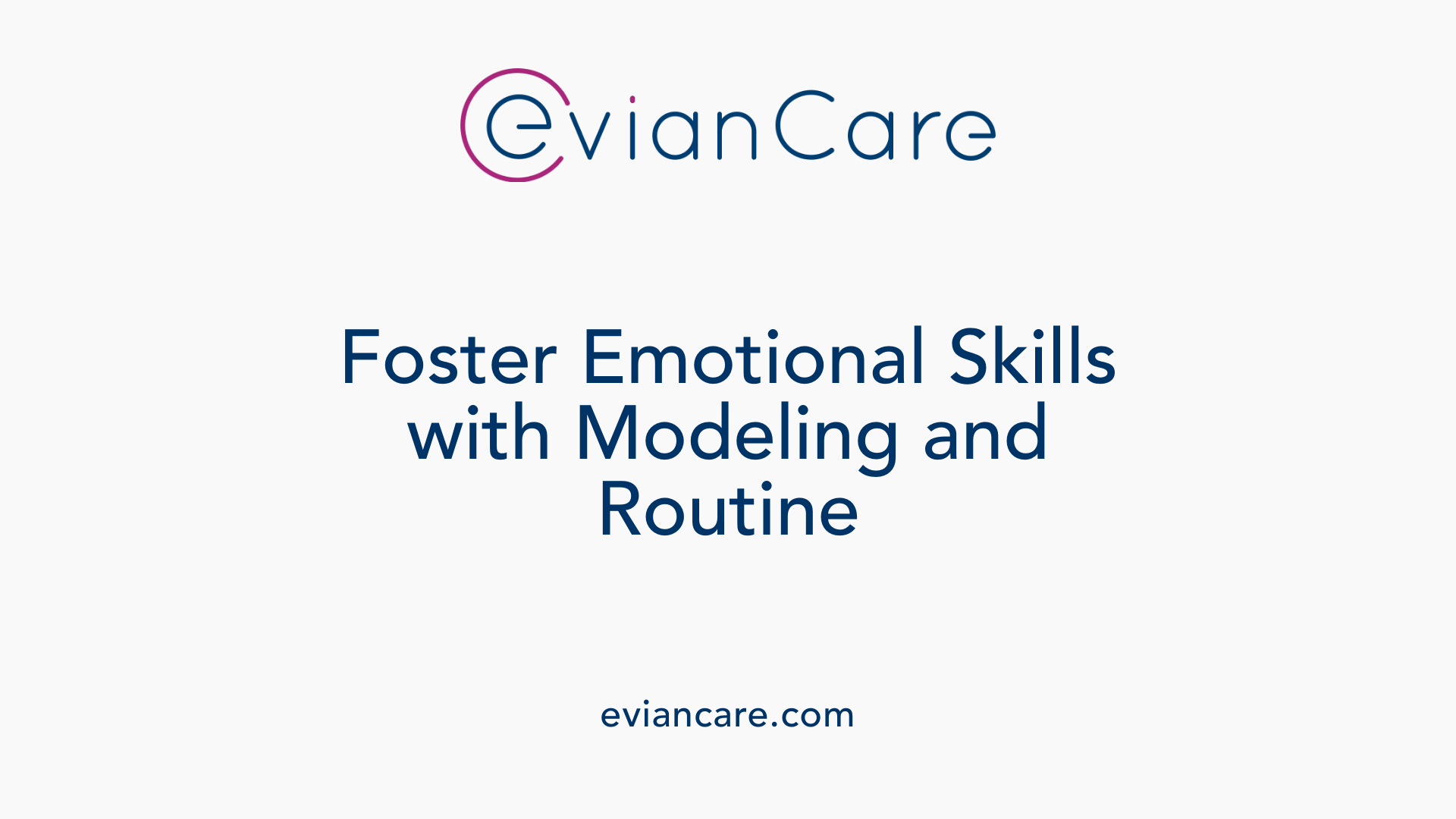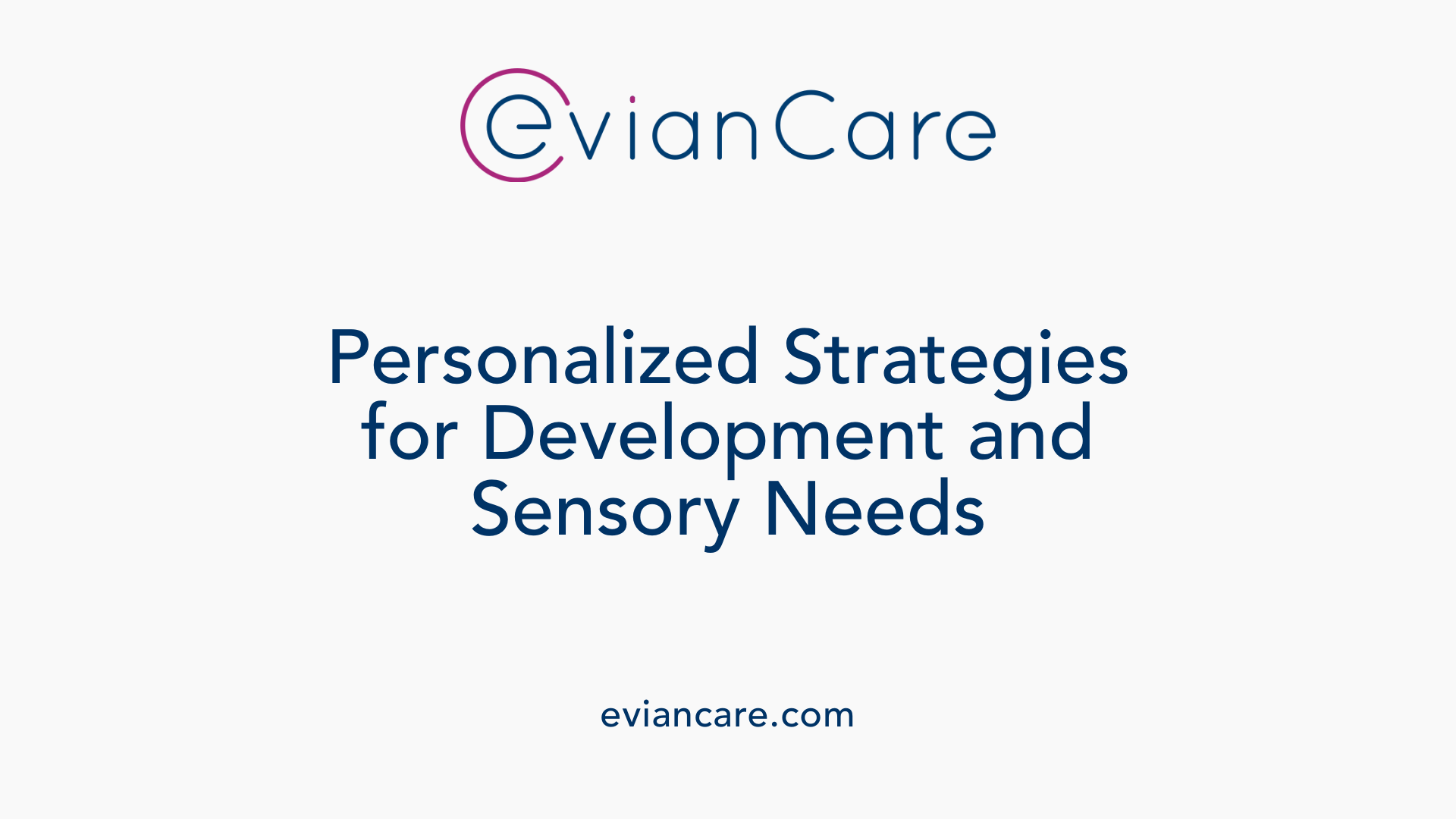
Understanding Emotional Regulation in Children with Developmental Disorders
Supporting children with developmental disabilities, such as LD, ADHD, or ASD, requires a comprehensive understanding of emotional regulation — the ability to manage thoughts, feelings, and behaviors in response to life's challenges. Emotional regulation is a critical skill that underpins social success, academic achievement, and mental health. Children’s development of these skills varies, influenced by genetic, emotional, and environmental factors, making early intervention and tailored support vital for fostering resilience and well-being.
The Importance of Emotional Regulation in Development and Well-Being

Why is emotional regulation important for a child's overall development and well-being?
Emotional regulation is vital because it shapes a child's ability to interact positively with others, succeed in school, and build resilience. Children who learn to recognize and control their emotions are better equipped to foster healthy relationships with caregivers and peers. This ability also promotes better classroom behavior and helps children cope with stress and frustration.
When children develop strong emotional regulation skills early on, it supports their language development, cognitive growth, and emotional health. This foundation decreases the likelihood of behavioral issues and emotional disorders later in life. Support from parents, teachers, and other caregivers—through modeling calm behavior, creating predictable routines, and teaching coping strategies—is essential for fostering these skills.
Children's capacity to manage emotions continues to evolve through childhood and adolescence. Upbringing that emphasizes understanding feelings, using calming techniques, and practicing reflection helps develop this competence over time. Overall, effective emotional regulation enables children to handle life's challenges more confidently, fostering a sense of independence and mental wellness.
How does emotional regulation influence children's social interactions?
Children who manage their emotions well tend to form stronger friendships and participate more successfully in group activities. They are more likely to respond appropriately during conflicts, show empathy, and maintain positive communication.
Those with difficulty regulating feelings might act impulsively, withdraw from social situations, or have trouble calming down after frustrations, leading to social challenges. Helping children learn to identify and express their feelings appropriately enhances their social skills and makes interactions more positive and meaningful.
In what ways does emotional regulation support academic success?
Academic environments require focus, problem-solving, and the ability to handle setbacks—all of which are linked to emotional regulation. Children who control their emotions can concentrate better, persist through challenges, and participate actively in learning.
For children with emotional regulation difficulties, classroom disruptions, difficulties in following instructions, and frustration can impede learning. Tools such as visual aids, routines, and mindfulness practices aid in building these skills.
How does emotional regulation contribute to resilience and mental health?
Resilience—the capacity to bounce back from setbacks—is closely tied to emotional regulation. Children who can manage their emotions adapt more readily to change, recover from disappointments, and handle stress effectively.
Supporting emotional regulation early on reduces the risk of developing mental health issues such as anxiety and depression. Strategies like validation of feelings, positive reinforcement, and professional interventions if necessary, foster emotional stability and resilience.
| Aspect | Impact of Emotional Regulation | Supporting Strategies |
|---|---|---|
| Social Interactions | Better friendships, conflict resolution | Modeling calm behavior, empathy exercises |
| Academic Success | Increased focus, persistence | Visual supports, routine building |
| Resilience | Greater adaptability, stress management | Reflection, problem-solving skills |
| Emotional and Mental Health | Lower anxiety, depression | Validation, professional support |
Children develop emotional regulation skills at different rates influenced by their environment, temperament, and biology. Continuous support from caregivers and educators helps nurture these vital skills, securing healthier development and well-being.
Recognizing Signs of Emotional Regulation Difficulties
 Children struggling with emotional regulation often exhibit a variety of behaviors that indicate difficulty managing their feelings. One of the most common signs is frequent emotional outbursts, such as tantrums, crying, or verbal aggression. These outbursts tend to be intense and may be disproportionate to the triggering event.
Children struggling with emotional regulation often exhibit a variety of behaviors that indicate difficulty managing their feelings. One of the most common signs is frequent emotional outbursts, such as tantrums, crying, or verbal aggression. These outbursts tend to be intense and may be disproportionate to the triggering event.
Trouble calming down after upsetting situations is another key indicator. Children who cannot regain their composure easily or take a long time to recover from emotional episodes are likely experiencing regulation challenges.
Mood swings and irritability are also common, with children showing low frustration tolerance. They may become quickly irritable or angry over minor frustrations, making daily interactions more difficult.
Withdrawal from social activities or peers can suggest discomfort in emotional regulation, especially when combined with impulsivity or reckless behaviors. Children may act impulsively without considering consequences, which can lead to accidents or conflicts.
Overreactions to everyday stressors and sensory overload, such as becoming overwhelmed in noisy or busy environments, further point to regulation issues. Difficulty identifying or verbalizing emotions is also prevalent among children with these challenges.
In severe cases, poor emotional regulation can result in aggressive behaviors, self-harm, or social withdrawal. These signs highlight the need for supportive strategies, assessment, and possibly professional intervention to help children develop better emotion management skills.
Supporting Children through Modeling and Routine

How can parents and caregivers help children improve their emotional regulation?
Parents and caregivers play a vital role in helping children develop better emotional regulation skills. They can do this through consistent modeling of calm behavior, which teaches children how to manage their feelings by example. When adults remain patient and composed during challenging moments, children learn to imitate these responses.
Creating predictable routines also provides a sense of safety and stability. Regular schedules for meals, bedtime, and activities help children feel more secure, reducing anxiety and emotional outbursts. Consistent routines serve as frameworks within which children can learn to anticipate and adapt to daily challenges.
Another effective method is encouraging the development of emotional vocabulary. Teaching children to identify and name their feelings using simple words helps them understand and communicate their emotions more clearly. Use of visual aids like emotion charts or social stories that depict various feelings can reinforce this learning.
Visual aids and social stories are powerful tools in teaching emotional awareness. They offer visual cues and relatable scenarios that guide children in recognizing emotions and appropriate responses. This approach is especially helpful for children with neurodevelopmental disorders, who often benefit from concrete, visual information.
By combining modeling, routines, vocabulary development, and visual supports, caregivers can create a nurturing environment where children learn to regulate their emotions more effectively. Over time, these strategies foster resilience, helping children handle stress, frustration, and social interactions more successfully.
Interventions and Strategies Supported by Research
What are effective evidence-based interventions for emotional self-regulation in children with developmental challenges?
Research supports a variety of effective methods to help children develop emotional regulation skills, especially those facing developmental challenges. One prominent example is the Rochester Resilience Project, a school-based program designed specifically for young children with behavioral and social difficulties.
This program involves teaching hierarchy-based skills such as emotion monitoring, self-control, and maintaining regulation. It uses a combination of modeling, role-playing, and in vivo coaching tailored to children's developmental levels. The results from evaluations show substantial improvements: children in the program demonstrated better behavior control, increased task focus, and enhanced social skills with peers—especially among girls. The program also led to a significant decrease—by around 46%—in disciplinary referrals, and suspension rates dropped by approximately 43%. Effect sizes ranged from moderate, indicating meaningful behavioral changes supported by rigorous multilevel analyses considering the nested data structure.
In addition to school programs, other interventions like Cognitive-Behavioral Therapy (CBT), mindfulness practices, and psychoeducation have a solid empirical backing. CBT helps children recognize and reframe their emotions and thoughts, developing coping skills through structured sessions. Mindfulness activities teach children to focus on the present moment, which can reduce impulsivity and emotional reactivity.
Parent training programs also play a critical role. They teach caregivers strategies such as modeling calming behavior, using visual aids like emotion charts, and providing positive reinforcement. Skill-building through role-play and guided practice helps children apply learned techniques in real-life situations.
Creating a supportive environment is crucial. This includes establishing clear routines, providing predictable structures, and gradually scaffolding learning experiences. Tools like timers, visual checklists, and interactive apps help children practice self-regulation skills in low-pressure settings.
Combining direct skill development with a nurturing environment and caregiver involvement offers the most promising results. Overall, evidence-based practices emphasize a multidimensional approach to foster emotional self-regulation, which is vital for social success, academic performance, and mental health in children with diverse needs.
Professional Resources and Expert Support
Children facing emotional regulation difficulties can greatly benefit from specialized support provided by various healthcare professionals. Psychologists are integral in assessing emotional, cognitive, and behavioral issues, offering therapy that targets emotional awareness, self-control, and coping strategies. Speech therapists assist children whose language development impacts their ability to identify and communicate feelings effectively, which is essential for self-regulation.
Occupational therapists contribute by addressing sensory processing challenges and helping children develop routines and strategies to manage their emotional responses better. These professionals often collaborate to create comprehensive intervention plans tailored to each child's needs.
In addition to direct support, evidence-based approaches like Acceptance and Commitment Therapy (ACT) and Dialectical Behavior Therapy (DBT) provide effective frameworks. ACT emphasizes acceptance of emotions and commitment to value-driven actions, reducing struggle with difficult feelings. DBT focuses on mindfulness, emotional regulation, distress tolerance, and interpersonal effectiveness, especially helpful for children with intense emotional responses or neurodevelopmental conditions.
Strategies introduced by these therapies can include mindfulness exercises, emotional reappraisal, and skills training for managing impulsivity. Such approaches are adaptable to children's developmental levels and unique challenges.
Tailoring interventions is essential. Professionals assess each child's strengths, weaknesses, and environmental factors to customize strategies—whether through visual aids, social stories, or sensory activities. Family involvement is also vital; educating parents and caregivers about maintaining consistent routines, modeling calm behavior, and validating feelings supports the child's progress.
Community and family play a key role in reinforcing learned skills, creating a supportive environment that fosters emotional growth. Regular check-ins and flexible adaptations by professionals ensure interventions remain relevant and effective.
Overall, a multidisciplinary approach, combining clinical expertise with family engagement, enhances children's ability to develop healthy emotional regulation skills, promoting better mental health and social interactions.
Building a Supportive Environment for Emotional Growth
 Creating a nurturing environment is essential for helping children develop effective emotional regulation skills. Caregivers can start by establishing predictable routines that provide a sense of safety and structure. Consistent daily schedules for activities such as mealtimes, bedtimes, and playtime help children feel secure and reduce anxiety.
Creating a nurturing environment is essential for helping children develop effective emotional regulation skills. Caregivers can start by establishing predictable routines that provide a sense of safety and structure. Consistent daily schedules for activities such as mealtimes, bedtimes, and playtime help children feel secure and reduce anxiety.
Using positive reinforcement and praise encourages children to practice good behaviors and feel confident in their emotional growth. Acknowledging their efforts with kind words and rewards fosters motivation and a sense of achievement.
Supporting a designated calm-down space within the home or classroom gives children a safe place to regulate their emotions when overwhelmed. This space can include sensory tools, calming visuals, and relaxant activities like deep breathing or gentle music.
Caregiver involvement is vital. Consistent engagement and calm, respectful responses model appropriate emotional management. When caregivers stay calm during a child's emotional outburst, children learn to mirror these behaviors and better understand how to handle their feelings.
Research reinforces that a stable, supportive environment—characterized by clear expectations, routine, adult modeling, and positive reinforcement—significantly advances a child's emotional regulation. This caregiving approach fosters a trusting relationship and encourages children to develop self-awareness, problem-solving skills, and resilience.
To sum up, combining routines, positive reinforcement, designated calming areas, and consistent caregiver support creates a foundation where children feel secure and capable of mastering their emotions. This environment paves the way for healthier social interactions, better academic performance, and overall emotional well-being.
Integrating Developmental and Sensory Considerations in Support

How do language development and sensory processing influence self-regulation?
Children’s ability to regulate their emotions is heavily influenced by their language skills and sensory experiences. Language development allows children to label and communicate their feelings effectively, which is crucial for self-awareness and seeking help when needed. Visual aids, social stories, and emotion vocabulary are useful tools that help children articulate their emotions. Sensory processing also plays a vital role. Children with heightened sensitivity or sensory processing difficulties may become overwhelmed more easily, leading to emotional outbursts or withdrawal. For example, bright lights or loud noises can trigger sensory overload, making self-regulation harder. Understanding these sensory sensitivities helps caregivers tailor environments and activities that minimize sensory stressors. Recognizing these factors ensures that strategies are inclusive, fitting each child's developmental level and sensory profile.
How can strategies be tailored for individual needs?
Supporting children effectively requires individualized approaches. Observing each child's unique responses to stimuli, communication skills, and emotional triggers guides personalized intervention plans. For example, some children might benefit from visual schedules and calming sensory activities like kneading stress balls or using weighted blankets. Teachers and caregivers should incorporate flexible routines, which can be adjusted based on the child's mood and sensory state. Regularly practicing social stories and role-playing scenarios with children helps reinforce understanding and response to emotional challenges. Employing tools such as timers, apps, or assistive devices can provide additional structure, helping children manage transitions and frustrations at their own pace. Importantly, involving children in creating their strategies increases motivation and ownership of their emotional regulation.
How do we address delays and sensitivities in children?
Children with developmental delays, sensory sensitivities, or neurodevelopmental disorders often require specialized support to develop self-regulation skills. Interventions like occupational therapy, speech therapy, and specialized behavioral programs target underlying sensory or communication challenges. Creating a predictable environment with clear routines and consistent expectations helps reduce anxiety for children with sensitivities. Visual supports and social stories can prepare children for upcoming transitions or social interactions, decreasing their likelihood of becoming overwhelmed. Professional support from psychologists or therapists can also focus on building coping skills, such as deep breathing, mindfulness, and relaxation techniques tailored to the child's developmental level. Ultimately, patience, understanding, and consistent positive reinforcement foster an environment where children can gradually build their capacity to manage emotions effectively despite delays or sensitivities.
| Aspect | Consideration | Support Strategies |
|---|---|---|
| Language Development | Critical for expressing and understanding feelings | Use of social stories, emotion vocab, modeling |
| Sensory Processing | Overload can trigger dysregulation | Sensory-friendly environments, calming tools |
| Individual Needs | Unique responses require tailored approaches | Personalized routines, visual supports |
| Addressing Delays and Sensitivities | Need for specialized therapies and consistent routines | Occupational therapy, predictable environment, professional guidance |
The Path Forward in Supporting Emotional Health
Supporting children with developmental disabilities in developing emotional regulation skills is a joint effort that involves understanding their unique challenges, implementing evidence-based interventions, and fostering a nurturing environment. Through professional support, caregiver involvement, and tailored strategies, children can learn to manage their emotions more effectively, leading to improved social interactions, academic success, and overall resilience. Early and consistent interventions are key to helping these children navigate their emotional landscape, promoting their long-term mental health and well-being.
References
- How Can We Help Kids With Self-Regulation? - Child Mind Institute
- How to help kids understand and manage their emotions
- Self-Regulation Strategies For Children With Disabilities
- Intervention to Strengthen Emotional Self-Regulation in Children ...
- Supporting the Emotional Needs of Kids With Learning Disabilities
- Supporting Children with Emotion Regulation Challenges
- Supporting Children and Adolescents Through Emotional Regulation
- Managing Big Feelings: Emotional Regulation in Children












